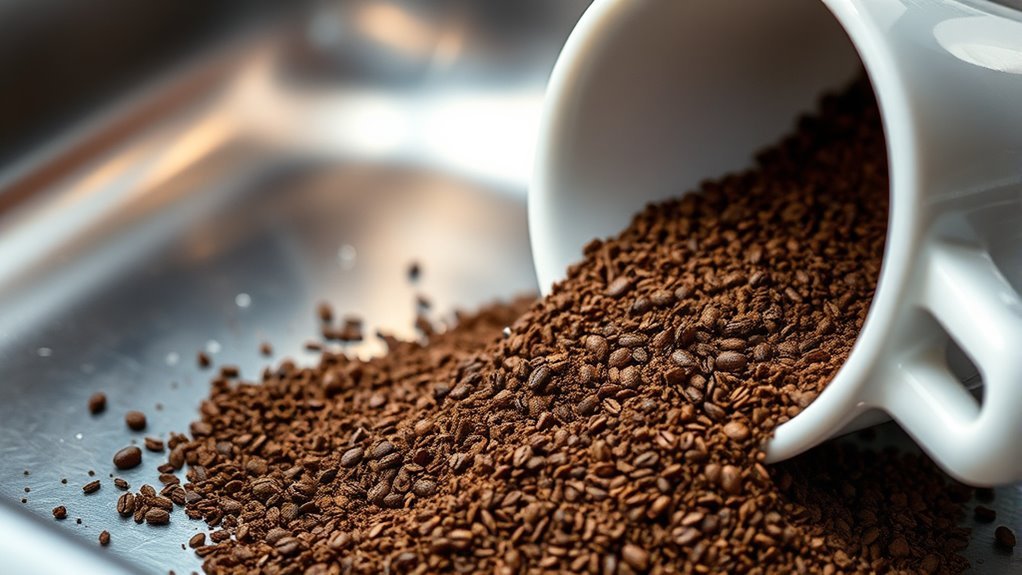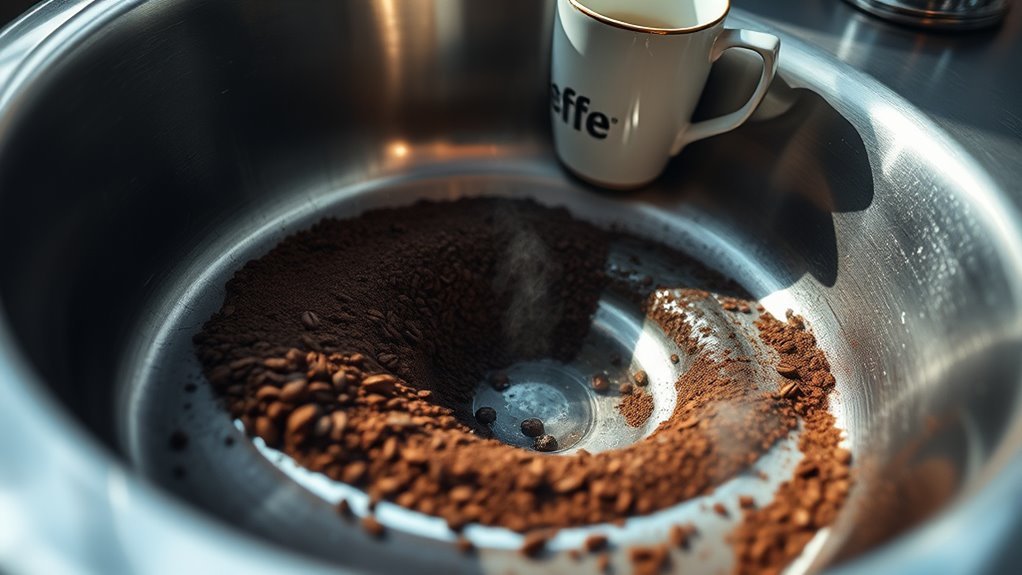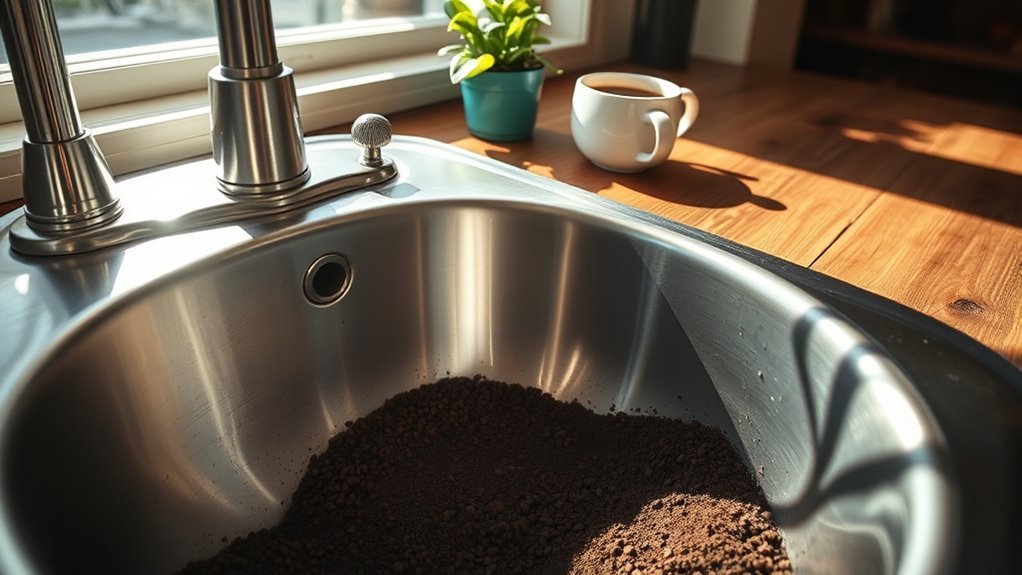Can Coffee Grounds Clog Drains
Yes, coffee grounds can clog drains. Their fine particles tend to settle and clump together in pipes, especially when mixed with grease or soap. Over time, this accumulation creates stubborn clogs that hinder drainage and complicate maintenance. Signs of a blockage include slow drainage and unpleasant odors. To avoid these issues, it’s best to dispose of coffee grounds in compost or trash. There’s more to discover about effective disposal methods and alternative uses for coffee grounds.
Understanding the Composition of Coffee Grounds

Coffee grounds are the leftover remnants from brewing your morning cup, and their composition plays a crucial role in understanding their potential impact on your plumbing. Primarily composed of organic material, coffee grounds contain fine particles that can clump together when wet. This characteristic can lead to drainage issues if disposed of improperly. The oils and soluble compounds in coffee also contribute to a sticky residue, which may exacerbate blockages over time. While a small amount might not cause immediate problems, regular disposal of coffee grounds down the sink can lead to more severe plumbing complications. To maintain your plumbing’s freedom, it’s best to dispose of coffee grounds in the compost or trash, rather than sending them down the drain.
How Coffee Grounds Can Accumulate in Drains
When you wash coffee grounds down the sink, they can gradually accumulate in the plumbing system, leading to potential clogs. Over time, even small amounts of grounds can contribute to drain blockage, creating a tricky situation. Here’s how coffee ground accumulation happens:
- Settling: Coffee grounds settle in pipes, especially if they’re mixed with grease or soap.
- Clumping: Once wet, coffee grounds can clump together, creating an obstruction in narrow pipes.
- Combining: They can combine with other debris, increasing the likelihood of significant blockages.
The Risks of Pouring Coffee Grounds Down the Sink

Pouring coffee grounds down the sink poses several risks that can lead to costly plumbing issues. Over time, these grounds can accumulate, creating stubborn clogs that disrupt your daily routine. The fine particles mix with grease and soap residue, forming a sludge that can be hard to break down. This not only hinders proper drainage but also complicates sink maintenance. Regular drain cleaning becomes essential to prevent these buildups, which can result in expensive repairs if left unchecked. To maintain your plumbing system’s health, consider disposing of coffee grounds in compost or trash instead. This simple change can save you from the headaches and costs associated with clogged drains, giving you peace of mind and freedom from plumbing woes.
Signs of Clogged Drains Due to Coffee Grounds
If you’re noticing slow drainage in your sink, it could indicate a buildup of coffee grounds. Additionally, unpleasant odors and gurgling noises may signal that your pipes are struggling to clear debris. Recognizing these signs early can help you address potential clogs before they worsen.
Slow Drainage Issues
As coffee grounds accumulate in your plumbing, they can lead to noticeable slow drainage issues. If you’re experiencing sluggish drains, it might be time to take into account the following slow drainage causes related to coffee grounds:
- Build-up in pipes: Coffee grounds can clump together, creating blockages.
- Grease interaction: When mixed with grease, coffee grounds can exacerbate drainage issues.
- Improper disposal: Flushing coffee grounds down the sink increases the risk of clogs.
Regular plumbing maintenance is essential to prevent these issues. If you notice slow drainage, it’s best to address it promptly to avoid more severe blockages. By being proactive, you can maintain your plumbing and enjoy the freedom of a smoothly flowing sink without the hassle of clogs.
Unpleasant Odors Emanating
Unpleasant odors emanating from your drains can be a clear sign that coffee grounds are causing a clog. When coffee grounds accumulate, they create a breeding ground for bacteria, leading to foul smells that can permeate your kitchen or bathroom. If you notice these unpleasant smells, it’s essential to address the issue promptly to avoid further blockage and damage. Regular drain cleaning can help eliminate the buildup of coffee grounds and other debris. Consider using a mixture of baking soda and vinegar as a natural solution to break down the clog and neutralize odors. If the problem persists, don’t hesitate to consult a professional plumber for effective drain cleaning and maintenance to restore your drains to ideal functioning.
Gurgling Noises Occurring
Gurgling noises coming from your drains can indicate a serious issue, often linked to the accumulation of coffee grounds. These gurgling sounds are a sign of potential drain blockages that could lead to more significant plumbing problems if left unaddressed.
- Increased pressure in your pipes
- Slow drainage in sinks and tubs
- Unpleasant odors accompanying the gurgling noises
Ignoring these signs can result in costly repairs and potential water damage. If you notice gurgling sounds, it’s essential to investigate the source. Regular maintenance and mindful disposal of coffee grounds can help prevent these issues. Remember, your freedom from plumbing troubles starts with proactive measures to keep your drains clear and functioning efficiently.
Best Practices for Disposing of Coffee Grounds
Proper disposal of coffee grounds is essential to prevent plumbing issues and maintain a clean environment. Instead of tossing them down the drain, consider eco-friendly disposal methods. Coffee ground composting is a great option, enriching your garden while reducing waste.
| Disposal Method | Benefits |
|---|---|
| Coffee Ground Composting | Enhances soil health, reduces landfill waste |
| Trash Bin | Simple but contributes to landfill buildup |
| Municipal Collection | Easy but may involve processing waste |
Alternative Uses for Used Coffee Grounds

Used coffee grounds aren’t just waste; they can serve practical purposes in your home and garden. As a natural fertilizer, they enrich soil with nutrients, promoting healthier plants. Additionally, their odor-neutralizing properties make them effective for eliminating unwanted smells in various spaces.
Natural Fertilizer Option
While many people toss their coffee grounds in the trash, you might consider them a valuable resource for your garden. Used coffee grounds are not just waste; they can be transformed into an eco-friendly fertilizer that enriches your soil. Here’s how they can benefit your plants:
- Nutrient-Rich: Coffee grounds add nitrogen, potassium, and phosphorus, essential for plant growth.
- Soil Structure: They improve drainage and aeration, fostering a healthier root system.
- Pest Deterrent: Grounds can help repel pests, reducing the need for chemical pesticides.
Odor Neutralizer Benefits
Coffee grounds are not just a boon for your garden; they also serve as an effective odor neutralizer around the home. Their unique properties enable them to absorb unwanted smells, making them a practical choice for various situations. You can place used coffee grounds in an open container in your fridge to tackle stale odors or use them in your trash can to combat unpleasant scents. Additionally, they work well as a natural deodorizer in your shoes—just sprinkle some grounds inside, let them sit overnight, and shake them out in the morning. By leveraging their odor absorption capabilities, you can create a fresher living environment, all while making good use of what would otherwise be waste.
Frequently Asked Questions
Can Coffee Grounds Cause Plumbing Issues in Bathrooms?
You might not realize it, but improper coffee disposal can lead to plumbing issues in your bathroom. When coffee grounds accumulate, they can combine with other debris, creating stubborn clogs. For effective plumbing maintenance, consider disposing of coffee grounds in compost or trash instead of the sink. This simple change can save you from costly plumbing repairs and keep your drains flowing smoothly, allowing you the freedom to enjoy your coffee without worry.
How Often Should I Clean My Drains to Prevent Clogs?
Think of your drains like a garden; they need regular care to thrive. For effective drain maintenance, clean your drains at least once a month. This routine helps in clog prevention, keeping debris and buildup at bay. If you notice slow drainage, consider more frequent cleanings. Using a mixture of baking soda and vinegar can do wonders, breaking down stubborn waste without harsh chemicals. Remember, a little effort goes a long way in ensuring smooth flow!
Are There Any Benefits to Composting Coffee Grounds?
Composting coffee grounds offers several compost benefits, making it a smart choice for nutrient recycling. When you add coffee grounds to your compost, you’re enriching the soil with nitrogen, which helps plants thrive. They also improve soil structure and drainage, promoting healthier root systems. By composting, you’re reducing waste and contributing to a sustainable cycle, allowing you the freedom to grow vibrant gardens while minimizing your environmental footprint. It’s a win-win!
Can Hot Water Dissolve Coffee Grounds Effectively?
When it comes to disposing of coffee grounds, hot water can be a helpful ally. Like a soothing balm for stubborn remnants, hot water’s effectiveness lies in its ability to loosen and dissolve those pesky grounds. While it won’t completely eliminate them, it can aid in breaking them down. For practical disposal, consider combining hot water with other methods to guarantee your coffee grounds don’t become a nuisance in your plumbing.
What Other Food Items Also Clog Drains Easily?
When considering what food items can clog drains easily, you should be cautious of grease buildup and food scraps. Grease can solidify in pipes, creating blockages, while food scraps, especially fibrous ones like celery or starchy items like pasta, can easily accumulate and obstruct flow. It’s crucial to dispose of these items properly to maintain clear drains and prevent costly plumbing issues in the future. Stay aware and keep your drains free!






